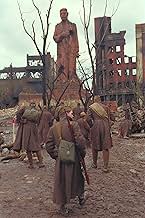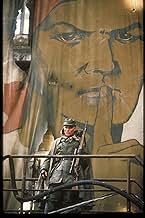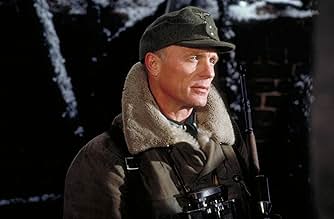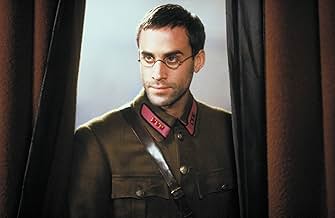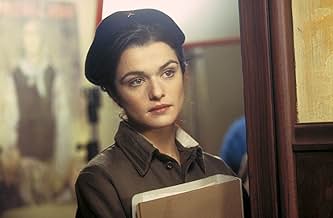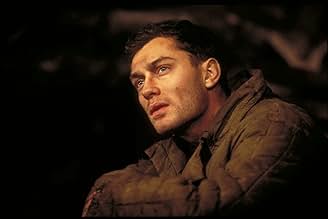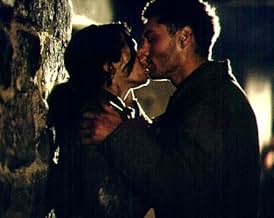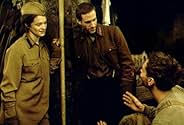Deux snipers, l'un russe, l'autre allemand, jouent au chat et à la souris pendant la Bataille de Stalingrad.Deux snipers, l'un russe, l'autre allemand, jouent au chat et à la souris pendant la Bataille de Stalingrad.Deux snipers, l'un russe, l'autre allemand, jouent au chat et à la souris pendant la Bataille de Stalingrad.
- Réalisation
- Scénario
- Casting principal
- Récompenses
- 7 nominations au total
- Sacha Filipov
- (as Gabriel Marshall-Thomson)
- Red Army General
- (as Hans Martin Stier)
- German NCO
- (as Clemans Schick)
Avis à la une
"Enemy At The Gates" may be one of the best war films I have seen since "Saving Private Ryan" because it is executed perfectly. With incredible performances, script and the impact I felt; "Enemy At The Gates" sets the tone as the first great war film of the 22nd century. This film can be served as the appetizer to the main course coming out soon, "Pearl Harbor."
Jude Law, Joseph Feinnes, Rachel Weisz, Ed Harris and Bob Hoskins come together to re-visit the Battle of Stalingrad in 1942. The best thing about seeing each one of the actors perform was they all gave 100 percent effort to make the film as real as possible; they did an excellent job. Fiennes, Weisz and Hoskins were the icing to a cake that was delicious from the start.
The highlights of "Enemy At The Gates" always came when Law and Harris were on screen because they played excellent psychological mind games with one another to win; furthermore, it was like watching master chess players playing for the grand prize. It was also enjoyable to see the strategies and tactics each would use to out-maneuver the other.
"Enemy At The Gates" drew me with its many action sequences similar to those in "Saving Priate Ryan." Also, the love triangle between the three main leads was interesting to watch and see how it would unfold. I felt like I was in the movie because the writer did an excellent job at making me feel exactly what they felt and experience what they were going through.
There is no rule that states dialogue is needed for a successful film. While "Enemy At The Gates" has dialogue, the scenes that have none stand out in my mind the most because we see close-ups of both snipers and the expressions on their faces. This is incredible to me because the intensity shown on their faces speaks volumes about what the movie is really about.
This may not be the best war film ever made but with two of the brightest young stars on the rise, an actress that is here to stay and a veteran that continues to turn in knock-out performances, "Enemy At The Gates" will be remembered for a long time.
The opening is an amazing opera of mass destruction. Then it's a matter of a chess game. It's a fascinating cat and mouse game in the ruins of the city. I'm glad that nobody decided to talk in a fake Russian accent. That would be too distracting. This is a rare good American war movie not about Americans.
The film opens with the harrowing transport of thousand of Russian soldiers across the Volga River to Stalingrad The recruits were packed onto steamers, barges, whatever they could find to ferry them across the river All that under a deluge of shells, bombs and explosions
By the time Vassili arrives to Stalingrad, the Nazis have a distinct edge, and Soviet morale is at an all-time low
Leading the Russians in their seemingly futile defense is Nikita Kruschev, played by Bob Hoskins The Germans, at that time, were overrunning the place and the Russians were in an appalling state It was the most awful battle of the war
Joseph Fiennes plays Danilov, an idealistic Russian officer who passionately speaks about his belief in getting the troops to turn the grave situation in Stalingrad around He finds the perfect inspiration in Vassili
Rachel Weisz plays a young woman who volunteers to help in the war effort She's literally protecting the people she grew up with When she meets Vassili, he just has a natural intelligence, a natural instinct
Jude Law is remarkable as the young sharpshooter Vassili Zaitsev who conveyed both humanity and intensity There's such a fierce intelligence and liveliness in his eyes He can also be very quiet and internal Vassili found the complexity within the silence and stillness In fact to be a sniper is very much about a man of action through stillness Vassili represented the ultimate hero, the symbol of someone who could instill hope and belief in victory amongst the troops, because his skills as a sniper were unparalleled
Ed Harris played Major Konig, the German sharpshooter sent to hunt down Vassili He knows that Vassili was picking off German officers with some regularity, and was becoming a folk hero for the Russian soldiers as well as the Russian populace... He decided to eliminate him
The casting of Ed Harris opposite Jude Law resulted in a striking visual link between their characters They both have these unbelievably penetrating blue eyes And director Jean-Jacques Annaud began to see the duel through their eyes And one of the first shots of Ed Harris was a close-up of his blue eyes
Annaud painted the tensions very clearly and concentrated purely on the eyes of the Jude Law and Harris and, of course, on their rifles and how they were hidden and what they were doing Basically, the core of his camera is the duel of their eyes, duel of men, duel of snipers, therefore a confrontation of people that scan the surrounding buildings, and try to decipher what they see
Now I'm prepared to believe that snipers played a valuable role in this kind of warfare - I wouldn't know - but Vassili's primary value, we must assume in the absence of information to the contrary, is as propaganda - a means of keeping up the morale of the local troops. But there's something circular here. The snipers are the only people we see doing any actual fighting, and by the end of the film they seem to be devoting all their efforts to shooting a German sniper who is in turn doing nothing but trying to shoot Vassili. What does ANY of this have to do with, you know, the invasion?
The fact that the troops of a hostile foreign power are on Russian soil (they haven't yet been defeated, and it looks to be only a matter of time before even Moscow would be overrun) doesn't seem to motivate the characters to do much. Nobody makes a single decision for the good of the war effort as a whole. Danilov builds up the Vassili legend because of personal feelings and is ready to tear it down later for other personal reasons; Tania wants to kill Germans - kill them herself, by hand, rather than help her fellow soldiers as best she can by working in intelligence - because they killed her parents; Danilov tries to transfer her to a safer job not because that's where she should be (it's a mere coincidence that that IS where she should be), but because he's hitting on to her; Vassili's heart isn't in the duel with the German sniper until he has a casual acquaintance's death to avenge. When Sacha's mother is told that her son is a traitor (now serving the forces who have bombed the city she grew up in to rubble), her only reaction is, "Perhaps he'll be safer with them than with us." Wherever we look, we see dreary personal concerns. Did any of these people notice that the enemy IS at the gates?
If Anaud was trying to make his characters more plausible by making them pettier, he failed. When Sacha tells a third party what we supposedly already know - that Tania is in love with Vassili - it came as news to me. I hadn't seen any insipient love anywhere. I suppose I ought to have worked it out, by assuming that the single female character must be there to fall in love with someone and using a process of elimination to work out who it was (she plainly didn't care for one of the two candidates, therefore she must be head over heels with the other one), but really, even in a movie as dull as this, I have better things to do.
By Blake French:
"Enemy At The Gates" takes place in 1942 and details a cat and mouse chase between two snipers. The mouse is a young Russian named Vassili Zaitsev (Jude Law), who arrives on the shores of the Volga River to defend Stalingrad, an important city in which the German's are attempting to capture. Zaitsev soon finds himself befriending a political officer named Danilov (Joseph Fiennes), who is impressed by the soldiers quick skills and decides to glorify him through the local press. Zaitsev becomes a political icon for the locals, giving them encouragement and increasing their hope for victory.
The cat is an opposing sniper named Major Koenig (Ed Harris), a famous sharpshooter called upon to kill Zaitsev. Koulikov (Ron Perlman), another talented sniper, is assigned to help Zaitsev in killing Koenig before the Major takes a victory shot. To further complicate matters, Zaitsev falls in love with another soldier, Tania (Rachel Weisz), whose parents were killed by the enemies, and wants to redeem their honor.
"Enemy At The Gates" certainly paints a vivid, graphic depiction of war. The atmosphere is unsettling and bleak, the characters are almost always dirty and sleepless, the fighting scenes consist of brief, short, instantaneous shots, but the sequences are fast-paced, genuine, and disturbing. The city looks battered and tormented. The dialogue goes hand and hand with the character's actions; the plot is challenging and the movie is focused, about something solid. In the sequences where Koenig and Zaitsev challenge one another, the tension is very effective. The movie tends to realize that, and concentrates a great deal of effort in making those scenes suspenseful and taut.
Joseph Fiennes plays a meek, nervous character and does a good job at bringing him to life believably. Jude Law, whose last work in "The Talented Mr. Ripley" provides a tough act to follow, accomplishes great things with a determined and assiduous character. Ed Harris is the standout actor here, in a harrowing, steadfast, juicy performance. Rachel Weisz cannot do a whole lot with her character, however. She often feels strained and contrived.
"Enemy At The Gates" tries hard to express the subject of the media's influence in our culture. If the film, co-written and directed by Jean-Jaques Annaud ("Seven Years in Tibet"), would have stayed on that concept, it would have been a whole lot better. The romance between Zaitsev and Tania is kind of unnecessary, and I am not sure if the sex scene is obligatory or advances their relationship. This love side story lacks passion; a lot of it feels mechanical and routine. "Enemy At The Gates" is still a consistently intriguing war film-rare because it does not involve Americans. While we are never really concerned about the outcome of the actual war, nor do we entirely care about several aspects of the main characters, there are many good scenes of suspense, and the overall mood of the movie is effective. "Enemy at the Gates" is worth seeing if it sounds interesting to you.
Le saviez-vous
- GaffesIn the scene where Vassili is lighting the cigarette butt he picked up from the German sniper, it's apparent by the flame he uses a butane lighter. Butane lighters were not invented until the 1950's.
- Citations
Commisar Danilov: I've been such a fool, Vassili. Man will always be a man. There is no new man. We tried so hard to create a society that was equal, where there'd be nothing to envy your neighbour. But there's always something to envy. A smile, a friendship, something you don't have and want to appropriate. In this world, even a Soviet one, there will always be rich and poor. Rich in gifts, poor in gifts. Rich in love, poor in love.
- Crédits fousThe end credits are slanted and curved.
- Bandes originalesLa Chanson des Artilleurs
Music by Tikhon Khrennikov
Lyrics by Viktor Gusev
(C) Musikvertag Hans Sikorski, Hamburg
Performed by The Red Army Choir (as Les Choers De L'Armee Rouge)
Courtesy of 7 Productions, Paris
Meilleurs choix
- How long is Enemy at the Gates?Alimenté par Alexa
Détails
- Date de sortie
- Pays d’origine
- Sites officiels
- Langues
- Aussi connu sous le nom de
- Stalingrad - Enemy at the Gates
- Lieux de tournage
- Sociétés de production
- Voir plus de crédits d'entreprise sur IMDbPro
Box-office
- Budget
- 68 000 000 $US (estimé)
- Montant brut aux États-Unis et au Canada
- 51 401 758 $US
- Week-end de sortie aux États-Unis et au Canada
- 13 810 266 $US
- 18 mars 2001
- Montant brut mondial
- 96 976 270 $US
- Durée
- 2h 11min(131 min)
- Couleur
- Mixage
- Rapport de forme
- 2.35 : 1


